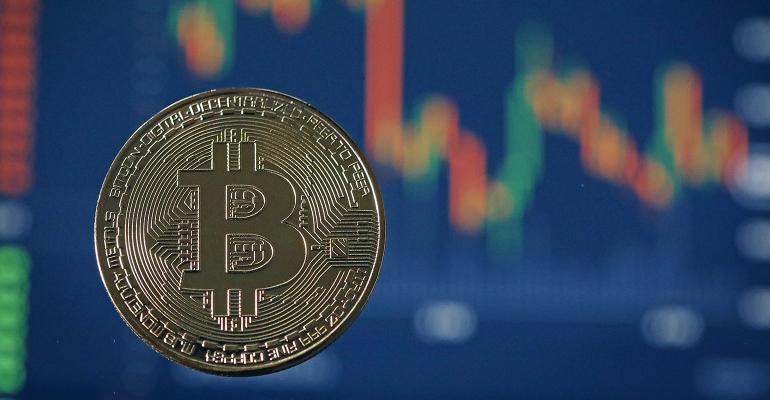(Bloomberg) -- Spot Bitcoin ETFs haven’t even been approved in the US, and yet already some see them as an existential threat to the futures-based funds that came before them.
BlackRock Inc. leads a group of firms awaiting word from regulators on their filings to launch what would be the first US ETFs linked to the spot price of the largest cryptocurrency. Grayscale Investments is also in the mix after scoring a legal victory in its quest to convert its $16 billion Bitcoin trust into an exchange-traded fund. Proponents are optimistic that the heft of the issuers involved and Grayscale’s recent court win may finally tilt the odds in favor of these funds being approved.
As of now, the closest US fund investors can come to investing in the cryptocurrency is through products that track Bitcoin futures contracts. When these funds debuted in October 2021, their coming out broke records — but they weren’t able to sustain that same level of excitement for long, and their combined market value has since leveled off at about $1 billion. The arrival of spot-based funds — which analysts say would track the price of the coin more closely and at a potentially lower cost — may threaten even that toehold.
“We would expect the assets and volume to coalesce around one or multiple spot-Bitcoin ETFs because they are superior products for most types of investors,” said James Seyffart, an analyst at Bloomberg Intelligence. “New money, particularly those looking to buy and hold over longer time periods, will be attracted to a spot product, which is also likely to be cheaper and more efficient than the current futures ETFs on US exchanges.”
If approved, the US spot Bitcoin ETF market has the potential to grow into a $100 billion juggernaut in time, according to Bloomberg Intelligence estimates.
Bitcoin-futures ETFs, of which the roughly $914 million ProShares Bitcoin Strategy ETF (ticker BITO) is by far the largest, received a warm welcome because their approval marked a watershed moment for the crypto industry. After a years-long fight for such funds in the US, issuers were finally able to entice investors with a product that offered easier exposure to the digital-assets market.
But the funds have trailed Bitcoin’s rally this year. The lag can, at least partly, be explained by which specific futures contracts the ETFs hold, and the expense associated with rolling them over as they expire, BI’s Seyffart has found. These roll costs eat into returns, causing the funds’ performance to become unmoored from the asset they track.
“The BTC-futures ETFs will probably experience significant outflows if spot-based ETFs are approved,” said K33’s Vetle Lunde. “They are far less straightforward in addition to incurring higher costs due to rolling, thus leading to underperformance over time.”
With spot ETFs more likely than futures-based ones to be a reflection of real-time supply and demand, their introduction may cause “migration of trading activity and liquidity” away from Bitcoin futures markets in the US, “to the extent spot Bitcoin ETFs replace futures-based Bitcoin ETFs,” wrote JPMorgan strategist Nikolaos Panigirtzoglou in a July note.
A ProShares spokesperson said “investor demand for BITO, the world’s largest Bitcoin-linked ETF, continues to be strong, with an average daily trading volume of nearly $135 million in 2023 that puts it in the top 5% of all US ETFs. A regulated futures market offers strong custody protections and robust liquidity, making BITO a compelling choice for investors seeking exposure to Bitcoin.”
Read more:
Grayscale Faces ‘Instantaneous’ Fee War in US Bitcoin ETF Race
Bitwise Urges SEC to Greenlight Bitcoin Spot ETFs All at Once
Spot funds may offer compelling reasons of their own, including potentially much lower fees than what the current futures-ETF lineup charges. Fee wars are a familiar phenomenon in the increasingly crowded ETF arena — both in new categories as well as established asset classes — and many are expecting fierce competition between different issuers should Bitcoin ETFs launch.
“If investors are faced with the choice of spot versus futures, they will likely always go with a spot ETF unless they’re specifically looking for a leveraged or inverse product,” said Roxanna Islam, associate director of research at VettaFi. “Spot ETFs will have to come out with lower fees to remain competitive. This could be even more significant if we see a mass approval of spot ETF products where a lower fee could be what differentiates an ETF from its peers.”
Whichever way the rivalry among new issuers shakes out, they may not leave much room for anyone else.
--With assistance from Sam Potter.





